
Parasite
Scope & Guideline
Advancing knowledge in parasitology for a healthier world.
Introduction
Aims and Scopes
- Host-Parasite Interactions:
Research exploring the ecological and evolutionary dynamics between various parasites and their respective hosts, shedding light on co-evolutionary processes. - Molecular and Genomic Studies:
Utilization of molecular techniques to study the genetics, phylogeny, and epidemiology of parasites, enhancing the understanding of their biology and pathogenicity. - Zoonotic Diseases and Public Health:
Focus on parasites that have implications for public health, particularly zoonotic infections that can be transmitted from animals to humans. - Ecological and Environmental Parasitology:
Examination of the ecological aspects of parasitism, including the effects of environmental changes on parasite distribution and host susceptibility. - Innovative Control Strategies:
Research and development of new therapeutic approaches and control measures for managing parasitic infections in both humans and animals. - Taxonomy and Biodiversity:
Documentation and classification of new parasitic species, along with studies on the biodiversity of parasites in various ecosystems.
Trending and Emerging
- One Health Approach:
There is a growing trend towards integrating health perspectives across human, animal, and environmental domains, emphasizing the interconnectedness of health issues related to parasites. - Molecular Epidemiology and Genomics:
Recent papers indicate a significant increase in the use of molecular tools for epidemiological studies, focusing on genetic diversity, transmission dynamics, and resistance mechanisms among parasites. - Vector-borne Diseases:
Research on parasites transmitted by vectors (e.g., mosquitoes, ticks) is expanding, reflecting heightened awareness of vector ecology and its implications for disease control. - Impact of Climate Change on Parasitism:
Emerging studies are increasingly addressing how climate change affects parasite life cycles, host interactions, and disease patterns, reflecting a timely and critical area of research. - Immunoparasitology and Vaccine Development:
There is a notable increase in research focusing on host immune responses to parasites and the development of vaccines, highlighting the importance of immunological approaches in combating parasitic diseases.
Declining or Waning
- In vitro Studies of Parasite Biology:
There has been a noticeable decrease in the number of in vitro studies exploring basic parasitology, possibly due to a shift towards more complex in vivo and ecological studies that better represent real-world interactions. - Traditional Morphological Taxonomy:
As molecular techniques become more prevalent, there is less emphasis on traditional morphological taxonomy in recent publications, indicating a potential decline in this area of research. - Studies on Historical Parasitology:
Research focusing on historical perspectives or archaic parasitological studies has seen reduced interest, likely overshadowed by contemporary investigations that address current public health issues. - Parasitology of Domestic Animals:
Publications specifically addressing parasitology in traditional domestic animal contexts appear to be diminishing, as there is a growing focus on wildlife and zoonotic aspects of parasitism.
Similar Journals
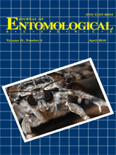
JOURNAL OF ENTOMOLOGICAL SCIENCE
Innovative Research for a Deeper Understanding of InsectsJOURNAL OF ENTOMOLOGICAL SCIENCE, published by the Georgia Entomological Society Inc, is a crucial resource in the field of insect science and ecology. With a rich history since its inception in 1993, the journal provides a platform for innovative research and comprehensive reviews addressing various aspects of entomology. Although not an open-access journal, it is highly regarded within its community, holding a Q3 ranking in Agronomy and Crop Science, Ecology, Evolution, Behavior and Systematics, and Insect Science as of 2023. Each issue promises to contribute valuable insights to professionals, researchers, and students alike, making it an essential publication for those looking to stay abreast of developments in entomological studies. The journal's editorial commitment ensures that it remains at the forefront of entomological research through rigorous peer reviews and a dedication to scholarly excellence.
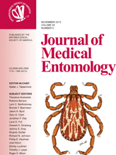
JOURNAL OF MEDICAL ENTOMOLOGY
Illuminating the impact of insect vectors on health.JOURNAL OF MEDICAL ENTOMOLOGY, published by Oxford University Press, is a prestigious journal dedicated to advancing the field of medical entomology, a critical area of study that explores the intersection of insect biology and public health. With an ISSN of 0022-2585 and an E-ISSN of 1938-2928, the journal features high-quality research articles and reviews that delve into the impacts of insect vectors on infectious diseases and parasitology, making it an essential resource for professionals and researchers alike. The journal has garnered significant recognition in the academic community, currently ranking in the top quartiles: Q2 in Infectious Diseases, Q1 in Insect Science, Q2 in Parasitology, and Q1 in Veterinary (miscellaneous), reflecting its influential contributions to these disciplines. With its comprehensive coverage of topics spanning across medical entomology and veterinary sciences, authors and readers will find a platform rich in valuable insights and data. The journal's long-standing history, dating back to its inception in 1964, ensures a legacy of excellence that continues through 2024 and beyond. While it does not currently offer open access, researchers are highly encouraged to engage with its content to foster a deeper understanding of the crucial role that insects play in human and animal health.
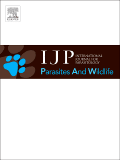
International Journal for Parasitology-Parasites and Wildlife
Fostering Insights into Ecological Impacts of ParasitesThe International Journal for Parasitology-Parasites and Wildlife, published by ELSEVIER, is a premier open-access journal dedicated to advancing the field of parasitology and wildlife research. Established in 2012, this influential journal has garnered a reputation for excellence, as evidenced by its impressive rankings, including Q1 in Animal Science and Zoology and Q2 in both Infectious Diseases and Parasitology as of 2023. With an ISSN of 2213-2244, this journal serves as a critical platform for researchers, professionals, and students, fostering a deeper understanding of parasite-host interactions and their ecological impacts. The journal encourages innovative studies that contribute to the mitigation of infectious diseases and enhance wildlife conservation efforts. With a commitment to open access, the International Journal for Parasitology-Parasites and Wildlife ensures that cutting-edge research is easily accessible to the global scientific community, helping to bridge gaps in knowledge and stimulate further inquiry.
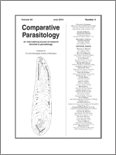
Comparative Parasitology
Fostering Interdisciplinary Insights in ParasitologyComparative Parasitology, published by the Helminthological Society of Washington, serves as a vital platform for the dissemination of innovative research in the fields of parasitology, ecology, and evolution. With an ISSN of 1525-2647 and an E-ISSN of 1938-2952, this journal has charted a course of academic influence since its inception in 1996, and is set to continue until 2024. Although it currently holds a Q4 ranking in both Ecology, Evolution, Behavior and Systematics and Parasitology categories, it guarantees significant contributions and diverse studies, providing an essential resource for researchers and practitioners in these domains. Located in the United States and managed by Allen Press Inc, Comparative Parasitology emphasizes open access, ensuring that vital research findings are readily available to the global community. The journal remains dedicated to fostering an understanding of the complexities of host-parasite interactions and promoting interdisciplinary collaboration, making it a crucial resource for students and professionals alike.

PARASITOLOGY RESEARCH
Unveiling the complexities of parasitic life.PARASITOLOGY RESEARCH, published by Springer, stands as a pivotal journal in the fields of parasitology, infectious diseases, and insect science, with a rich history dating back to 1987. Operating from Germany, this journal has garnered an impressive reputation, achieving a high ranking within various categories, including Q1 in Veterinary (miscellaneous) and Q2 across several relevant fields as of 2023. While it does not currently offer Open Access options, the journal remains a vital resource for researchers, professionals, and students seeking to contribute to and keep pace with advancements in parasitological studies. With a commitment to publishing high-quality research, PARASITOLOGY RESEARCH serves as an essential forum for disseminating findings that enhance our understanding of parasitic organisms and their impacts on health and the environment. Explore this journal to engage with cutting-edge investigations and reviews that drive innovation in parasitology and related disciplines.

Revista de Investigaciones Veterinarias del Peru
Innovating Animal Health Research Across BordersRevista de Investigaciones Veterinarias del Peru, published by UNIV NACIONAL MAYOR SAN MARCOS, stands as a pivotal resource within the field of veterinary sciences. With its ISSN 1682-3419 and E-ISSN 1609-9117, this journal aims to publish innovative research contributing to the advancement of veterinary practices and animal health. Since its inception in 1999, it has fostered an academic platform for professionals and researchers alike to share findings that are crucial for understanding and improving animal welfare in Peru and beyond. Although currently positioned in the Q3 category of Veterinary (miscellaneous) and ranked #163 out of 194 in the Scopus database, the journal's commitment to quality research and open access to veterinary knowledge continues to attract submissions and readership from a diverse audience. As it moves forward into 2024, the Revista de Investigaciones Veterinarias del Peru remains dedicated to disseminating critical insights that promote evidence-based practices in the veterinary field, stimulating further research and collaboration across continents.
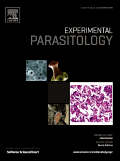
EXPERIMENTAL PARASITOLOGY
Elevating the Study of Parasites and Their Impact on HealthEXPERIMENTAL PARASITOLOGY, published by Academic Press Inc Elsevier Science, is a prominent journal in the domains of immunology, infectious diseases, and parasitology, with roots extending back to 1951. This journal, bearing the ISSN 0014-4894 and E-ISSN 1090-2449, serves as a critical conduit for sharing advancements in the understanding of parasite biology, host-parasite interactions, and the immunological responses elicited by parasitic infections. Although it currently operates under a subscription model without open access options, its rigorous scholarly content is vital for researchers and practitioners alike looking to stay informed on the latest developments and applications in the field. With a recent categorization as Q3 in key scientific categories, including Infectious Diseases and Parasitology, and a Scopus ranking solidifying its relevance, EXPERIMENTAL PARASITOLOGY is an essential resource for those committed to advancing knowledge and solutions to parasitic diseases.

ACTA PARASITOLOGICA
Connecting Researchers to Parasitic ChallengesACTA PARASITOLOGICA, published by SPRINGER INT PUBL AG, stands as a pivotal journal within the field of Parasitology, boasting an ISSN of 1230-2821 and an E-ISSN of 1896-1851. Based in Germany, it has been providing valuable insights and research contributions since its inception, with publishing years converging from 1992 to 1994 and consistently from 1996 to 2024. The journal is recognized in the 2023 Category Quartiles as Q3 in Parasitology, indicating its significant impact and growing influence in the discipline, reflected in its Rank #43/79 in the Scopus Ranks for Immunology and Microbiology (Parasitology). Although not currently available in an Open Access format, ACTA PARASITOLOGICA remains a critical resource for researchers, professionals, and students alike, serving as a platform for the latest developments, methodologies, and discoveries in parasitic research. Its ongoing commitment to advancing the understanding of parasitic diseases and their impact on health and ecosystems underscores its importance in both academia and public health.
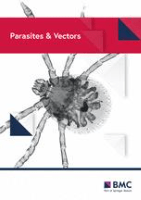
Parasites & Vectors
Unraveling the complexities of parasites and their vectors.Parasites & Vectors is a leading open access journal dedicated to the dissemination of high-quality research on the vectors of infectious diseases and their parasitic agents. Published by BMC in the United Kingdom, this journal has been at the forefront of its field since its establishment in 2008, contributing to our understanding of vector-borne pathogens through its rigorous peer-reviewed articles. With a notable impact factor and categorized in the top quartile (Q1) in both Infectious Diseases and Parasitology, it is an essential resource for researchers, professionals, and students worldwide. The journal ranks impressively within various categories, holding a position of 7th out of 194 in Veterinary General Veterinary and 12th out of 79 in Immunology and Microbiology Parasitology, indicating its significant contribution to the sciences. Accessible to all, Parasites & Vectors supports the global pursuit of knowledge in epidemiology and disease control, making it an indispensable platform for sharing innovative findings and fostering collaboration within the scientific community.

Parasites Hosts and Diseases
Bridging Gaps in Parasitology and Infectious Disease ResearchParasites Hosts and Diseases is an emerging academic journal focusing on the intricate relationships between parasites, their hosts, and associated diseases. Published by the Korean Society of Parasitology in collaboration with Seoul National University College of Medicine, this journal is a significant contribution to the fields of Infectious Diseases and Parasitology, and it has secured a place in the Q3 category for both disciplines as of 2023. With an ISSN of 2982-5164 and an E-ISSN of 2982-6799, this open-access publication aims to foster scholarly communication and provide a platform for researchers to disseminate their findings on critical issues related to parasitic infections and the pathogenesis thereof. Although it is still in the early stages of its history, the journal has already positioned itself as a useful resource within its field, with Scopus rankings showing it as 48th of 79 in Parasitology and 210th of 344 in Infectious Diseases, indicating its growing influence and the potential for impactful research. Situated in South Korea, and via its open-access model, Parasites Hosts and Diseases is committed to reaching a global audience of scientists, healthcare professionals, and students, all dedicated to understanding and combating the challenges posed by parasitic diseases.